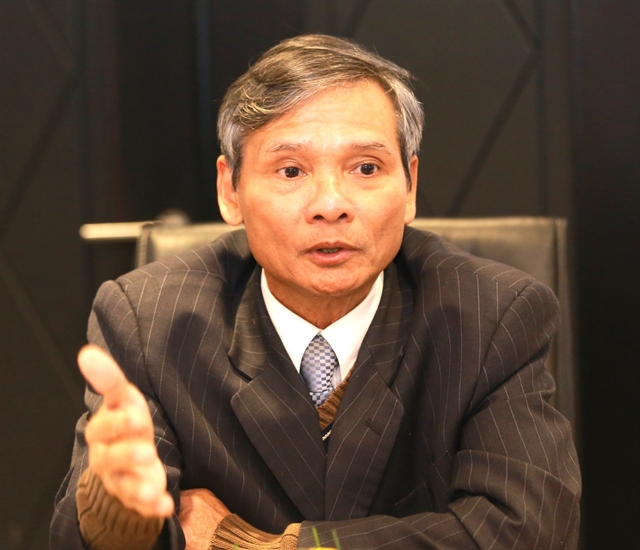 Economy
Economy


|
| Trương Văn Phước, a member of Prime Minister’s economic advisory group. VGP Photo |
Trương Văn Phước, a member of the Prime Minister’s economic advisory group, talks to the Government portal about the measures needed to retain economic growth.
A Government report presented at the National Assembly has mentioned the implementation of appropriate fiscal and monetary solutions to stimulate consumption in 2021 and further towards 2025. Could you please elaborate on these solutions?
The COVID-19 pandemic has affected economies on a global scale. If a country can’t control the disease, it would be impossible to obtain economic growth.
Việt Nam is among the few countries that contained the disease early and managed its economy very well to achieve positive growth this year. It is a miracle. However, it is a long journey to becoming a prosperous and wealthy country.
To achieve this goal, Việt Nam must maintain a high growth rate and a stable macroeconomy in 2021 and the 2021-2025 period.
We must choose an optimal growth model for the economy, in which resources are distributed in accordance with market rules, taking advantage of the Fourth Industrial Revolution’s achievements as well as removing barriers to development.
National financial resources are prerequisites for accelerating the economy. Reforming a financial market in a more professional manner and approaching the basic features of an international financial market will help resolve the bottlenecks that our economy faces, including funding for the budget deficit and high liquidity in the market.
It is noteworthy that the corporate bond market thrives in Việt Nam despite the country’s difficult situation. Many of the bonds belong to the real estate sector. What’s your comment on this issue?
Buying and selling bonds is a popular activity in the market.
Although Việt Nam has tightened its legal framework for the transaction of bonds, it is still easier to access capital from bond issuances than bank credit.
The reduction of interest rates in the first 10 months of this year might be one of the reasons that corporate bonds with higher interest rates are more attractive. That's why transactions of corporate bonds have recently increased strongly despite the difficult economic situation.
In my opinion, besides the development of government bonds on a very large scale, the existence of corporate bonds as well as banks have been positive signals, enriching the image of a financial market and meeting the development requirements of the real economy.
Việt Nam has been recently put on the US currency manipulation watchlist. What’s your opinion and what should we prioritise to solve the problem?
The goal of balancing trade, which is inherently in large deficits, becomes one of the top criteria that the US economic managers are looking for. The three criteria are: national current account surplus greater than 2 per cent of GDP; trade surplus with the US greater than US$20 billion; and foreign currency net buying greater than 2 per cent of GDP.
The US viewpoint that China's annual trade surplus, for example, in 2019 was $345.2 billion, is due to China manipulating the exchange rate or devaluing the yuan. It indirectly subsidises exports, creating an unfair competitive advantage in international trade.
In fact, the US Government has released a list of many countries accused of currency manipulation, including Việt Nam. Being added to the watchlist doesn’t mean they have reached a conclusion on the issue, so we still have a chance to resolve the problem.
I agree with the Government, ministries and agencies who will continue to intensify dialogue with their US counterparts.
At a meeting with visiting CEO of the US International Development Finance Corporation Adam Boehler on October 26, Prime Minister Nguyễn Xuân Phúc said Việt Nam did not devalue its currency to create a competitive advantage for exports or support specific industries.
Currency devaluation could undermine macroeconomic stability, people’s trust and investors’ confidence, resulting in “great harm to the economy”, he said.
In fact, it can be seen that Việt Nam's exports have increased sharply in the past five years, with a surplus, not only with the US, but also many other countries thanks to new free trade agreements. Of these, exports of foreign-invested enterprises are quite large.
Recently, we have also increased imports of goods and raw materials from the US market.
The net buying of foreign currency is a result of a large surplus in Việt Nam's balance of payments and flows of direct and indirect investment. If the Vietnamese đồng is used as a reference to the foreign currencies of partner countries, Việt Nam's inflation is often higher. This is the nature of the devaluation of the Vietnamese đồng with the US dollar.
In addition to strengthening dialogue with the US, we should increase imports of essential goods and hi-tech products from the US to lower the surplus and even balance trade with the US.
It is necessary to diversify derivative instruments for foreign exchange activities.
Only by doing so can we provide more clear evidence to prevent the US from thinking that Việt Nam is using the exchange rate to manipulate currency or create a commercial advantage. — VNS




